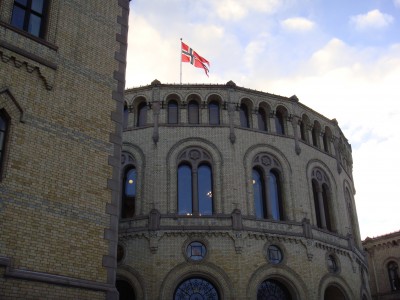Protests greet new data storage law
Members of the Norwegian Parliament (Stortinget) used more than nine hours to debate a controversial new data storage law pressed upon them by the European Union (Telecommunication Data Retention), amidst noise from the gallery and protests on the floor. A slim and unconventional majority finally approved the measure Monday night, but opponents vow to keep fighting for personal privacy and freedom.

Debate went on for more than nine hours inside the Norwegian Parliament (Stortinget) on Monday, before the controversial communications storage law was approved. PHOTO: Views and News
So heated was disagreement over the measure, known as the“datalagringsdirektiv”(literally, data storage directive), that it saw members of the Conservative Party break away from their own party to vote against it, while some politicians called the measure “Orwellian” and claimed that “Big Brother is truly now watching us all.”
One member of the conservative Progress Party, Bård Hoksrud, went so far as to say that the new law will allow police to use methods that would “make the Stasi and KGB green with envy.” It was one of those rare issues where Norway’s most conservative party was in agreement with its most liberal, the Socialist Left (SV), which claimed the new law will allow “massive surveillance,” where all communications will be registered and stored.
The lengthy debate also was disrupted at one point by a noisy protest from the gallery, where members of the public had gathered to listen to Norwegian lawmakers argue. One man yelled that his constitutional rights were being violated. He was quickly escorted out.
‘Don’t understand the consequences’
“This is very, very bad,” the leader of the Liberal Party (Venstre), Trine Skei Grande, told news bureau NTB right after the voting was completed. “I don’t think those who voted in favour of the measure really understand the consequences of this measure. Future generations will condemn us for what was approved tonight.”
“This is very, very bad,” the leader of the Liberal Party (Venstre), Trine Skei Grande, told news bureau NTB right after the voting was completed. “I don’t think those who voted in favour of the measure really understand the consequences of this measure. Future generations will condemn us for what was approved tonight.”
She was an early opponent of the measure, which will require storage of Norwegians’ telephone and Internet use and e-mail for up to six months, bringing Norway in line with an EU directive on telecommunications storage. Its purpose is to help police investigate and even prevent serious crimes and terrorism, but opponents claim it’s a serious violation of the right to private communication.
The issue split Norway’s left-center government coalition, with two of its three party members opposed but dominant Labour in favour. Labour then allied itself with the Conservative Party, normally its arch rival, and the two hammered out a compromise that was approved Monday night by a vote of 89 to 80.
The voting saw five members of the Conservatives, who also had opposed the measure since it surfaced in 2006, break away from their newly compromised party line and vote against the measure, thus maintaining their long-held opposition. That wasn’t enough, however, to block it.
Still some bargaining room
Dagfinn Høybråten, a former government minister from the Christian Democrats, noted that electronic communication will be stored with good intentions, but claimed the new law will weaken confidence between the state and its citizens.
Dagfinn Høybråten, a former government minister from the Christian Democrats, noted that electronic communication will be stored with good intentions, but claimed the new law will weaken confidence between the state and its citizens.
Justice Minister Knut Storberget of the Labour Party, who has fought for the measure, admitted that personal privacy and police needs can’t always be reconciled. But he was confident the limits on the law, including data storage for no more than six months, will maintain privacy in the long run. He had initially argued for storage of up to a year but settled for six months (the EU’s minimum requirement) in the compromise with the Conservatives.
Foreign Minister Jonas Gahr Støre had also lobbied hard for the measure to be approved, claiming approval will give Norway more bargaining room before the EU itself formally evaluates it later this spring. That can take up to two years, and opponents are already gearing up for ways to influence or even block its final approval at the EU level.
Views and News from Norway/Nina Berglund (News in English)

No comments:
Post a Comment